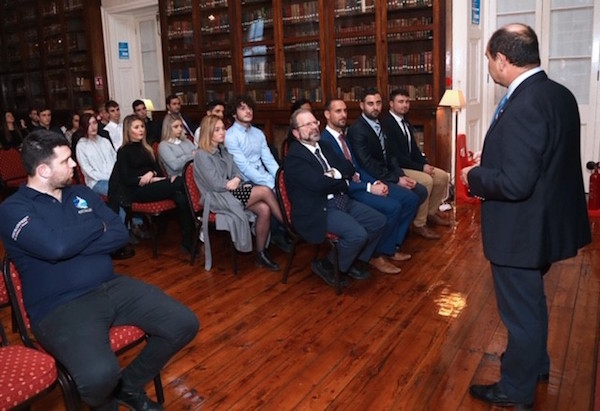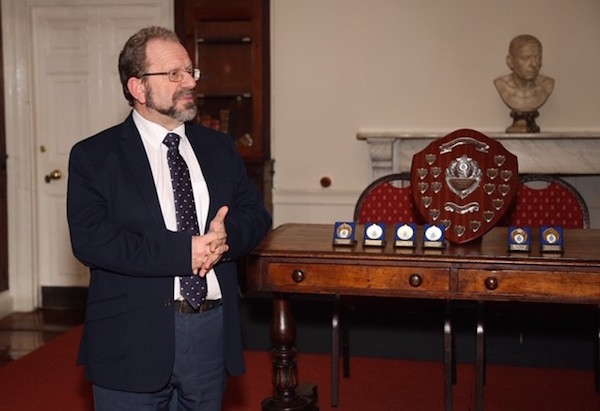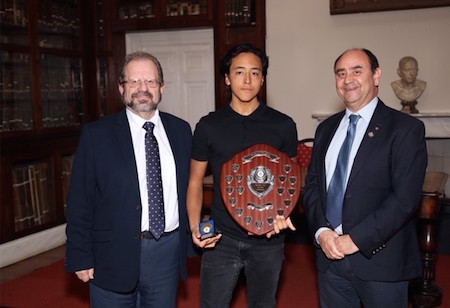Just before Christmas, the Minister for Education, Heritage, Environment and Climate Change, the Hon John Cortes presented Angelo Galdez with the Royal Life Saving Society’s “Giovanni Sene Award” for the best trainee lifeguard to qualify for the National Vocational Beach Lifeguard Qualification.
In his address, Min Cortes congratulated Angelo for achieving this award and praised all the Lifeguards for the excellent and valuable work carried out by them every summer on our beaches and the Bathing Pavilion. President of the Royal Life Saving Society (RLSS) Gibraltar, Norbert Sene MBE, explained that after consultation with the other RLSS Trainer/Assessors and the Department of Environment’s Beaches Management team, Angelo had been selected due to his outstanding performance during the training and his exemplary attitude, reliability and diligence on beach. Also congratulated was last year’s recipient Jansen Barnes.
This year the Department of the Environment and the RLSS decided to recognise the exceptional work of the experienced Beach Lifeguards as well as Pool Lifeguards (employed at the Bathing Pavilion), Disability Attendants and Pavilion Attendants by expanding the number of awards:
Best Experienced Beach Lifeguard: Jake Moreno
Best Experienced Pool Lifeguard: Yassir Khazali
Best Accessibility Attendant: Leeroy Woodjetts
Best Pavilion Attendant: Romina Chipolina
From mid-February onwards, 22 first time Beach Lifeguard trainees (plus 4 that needed to renew their qualification) were trained as assessed for this year’s bathing season in order to gain the RLSS National Vocational Beach Lifeguard Qualification (NVBLQ). All the Beach Lifeguard trainees were trained and assessed by RLSS Beach Lifeguard Trainer/Assessors, Michael Sene, Stewart Bonavia and Norbert Sene. The candidates had to achieve a good, basic level of fitness and be competent in the water as well as showing proficiency in the principles of beach supervision and rescue.
The assessment is designed to determine the competence of anyone engaged at any time in the role of Beach Lifeguard or undergoing training towards this role.
The NVBLQ is the benchmark for the certification of Beach Lifeguards in the UK and Gibraltar; and is endorsed and aligned with the International Life Saving Federation competency framework.
Nine new Pool Lifeguard trainees were trained this year by RLSS Gibraltar, GSLA and individual Pool Lifeguard Trainer/Assessors. The RLSS National Pool Lifeguard Qualification (NPLQ) has been developed to improve the standards of lifeguarding in pools in direct response to comprehensive consultation with the swimming pool industry.
Trials and courses for this year’s squad will commence in early February.
The NVBLQ course requires a minimum 40 hours of training and is split into four modules.
• Module 1 includes principles and knowledge of beach lifeguarding: it involves learning about the beach environment, beach patrolling, working practices and communication.
• Module 2 includes life support and first aid: which involved administration of first aid and CPR learning the signs, symptoms and treatment of certain conditions. During the assessment the lifeguards also achieved the RLSS Life Support 3 certificate.
• Module 3 includes ocean skills: this involves beach skills including understanding the use of the flags, whistle, rescue tube and rescue board.
• Module 4 includes pool skills: this involves fitness and lifesaving technique competency and casualty identification. In the practical assessment a 400m timed swim in 8 minutes or less is incorporated which determines whether the candidate continued to the next stage of the assessment. These practical assessments involved good practice in beach rescues and techniques.
The assessment comprises of an assessment by multiple choice questions on the candidates theoretical knowledge and understanding of all the modules.
In the practical assessment, candidates can take the four module assessments in any order except the pool skills module, which they must complete successfully before doing the ocean skills section. This is for safety reasons and to assure the assessor that the candidate is competent enough to undertake the ocean skills module.
The NPLQ course requires a minimum 36 hours of training and is split into three sections
• Section 1 includes principles and knowledge of the Lifeguard, Swimming Pool and Supervision.
• Section 2 includes Intervention, Rescue and Emergency action Plan.
• Section 3 includes life support and first aid: which involved administration of first aid and
CPR learning the signs, symptoms and treatment of certain conditions.
The assessment comprises of an oral assessment on the candidates theoretical knowledge and understanding of all the sections, plus a practical assessment on pool techniques and first aid.


